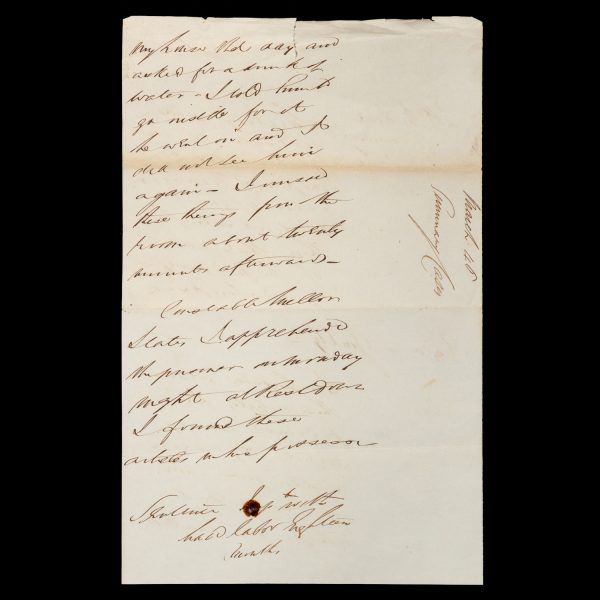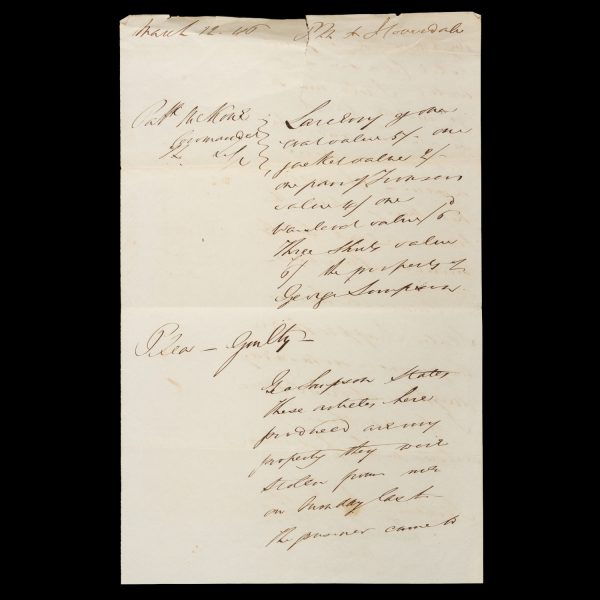# 41356
[McKONE, Patrick]
[TASMANIA; CONVICTS] Police magistrate’s case summary against recidivist convict Patrick McKone, one of the longest-serving prisoners in the Van Diemen’s Land penal system. Flowerdale (Upper Esk), March 1846.
$600.00 AUD
Manuscript in ink, 2 pp., foolscap folio (320 x 200 mm); original folds, short tear at top edge (no loss), otherwise well preserved.
Case summary prepared by an unnamed police magistrate at Flowerdale, near Wynyard, northwest Tasmania, dated 12 March 1846.
‘March 12 46. P[olice ] M[agistrate], Flowerdale.
Patrick McKone, Coromandel. TL, Life.
Larceny of one coat value 5/-, one jacket value 2/-, one pair of trousers value 4/-, one waistcoat value 6d, three shirts value 6/-, the property of George Simpson.
Plea – Guilty.
G. Simpson states “These articles here produced are my property, they were stolen from me on Monday last. The prisoner came to my house that day, and asked for a drink of water. I told him to go inside for it. He went in and I did not see him again. I missed these things from the room about twenty minutes afterwards.
Constable Mellor states “I apprehended the prisoner on Monday night at Residence. I found these articles in his possession.”
Sentence: Life with hard labor Eighteen Months.‘
The document is docketed on the verso: ‘March 46 / Summary cases’.
Patrick McKone had been convicted of larceny at the Sussex Assizes in 1819 and was sentenced to transportation for 7 years. He arrived in Van Diemen’s Land on the Coromandel at the end of March 1820. He became a repeat offender virtually as soon as he stepped off the boat, as this report in The Hobart Town Gazette, 25 March 1820, tell us:
‘Patrick McKone, a prisoner who only landed the day before from the Coromandel, was charged with stealing several articles of wearing apparel, the property of Joseph Jobson, a private of the 46th Regiment, one of the guard in the same vessel ; which charge being clearly proved, he was sentenced to receive 100 lashes and to work 12 months in the gaol gang.’
McKone was physically extremely tough, because he managed to survive this outrageously severe corporal punishment: a sentence of 100 lashes would usually have resulted in the prisoner’s death. However, he was also a hopeless recidivist who was addicted to stealing. The decades-long story of McKone’s time in the Van Diemen’s Land penal system makes for some very sad reading. His convict life is summed up in an article that appeared in the Hobart Town Daily Mercury, 3 June 1858, in which McKone is depicted as a truely pathetic figure:
‘BRIGHTON POLICE OFFICE. A Character At this office on Tuesday last, Patrick McKone was sentenced to six months imprisonment with hard labour for having absconded on the 8th day of April last, and received a similar sentence for stealing a coat, the property of James Bonney of Bridgewater. Upon receiving sentence, McKone begged the Magistrates to grant him one little favour, which was ” that they would be so kind as to send him to Port Arthur.” During his criminal career, he seems to have found this the most agreeable place of residence for a person of his peculiar idiosyncracy. A crown prisoner of nearly forty years standing, a ticket of-leave is to him rather a nuisance than otherwise in the earlier part of his career he expiated his offences chiefly under the hands of the flagellator, by whom he was endorsed at various periods with 486 lashes. The sentences atoned for by imprisonment, with and without hard labour, have consumed about twelve years of his valuable time. He seems never to have had the physical energy to turn bushranger, though he did once threaten to knock out his master’s brains, for which he was duly tried, with the usual result at Quarter Sessions. Having sprigged under the various systems of prison discipline, from assignment in Colonel Arthur’s time to probation with Dr. Hampton, under whom he appears to have become incurable, his only wish is now to spend the remaining portion of his thriftless life at Port Arthur, where he would doubtless meet with a numerous circle of recognised friends.’









